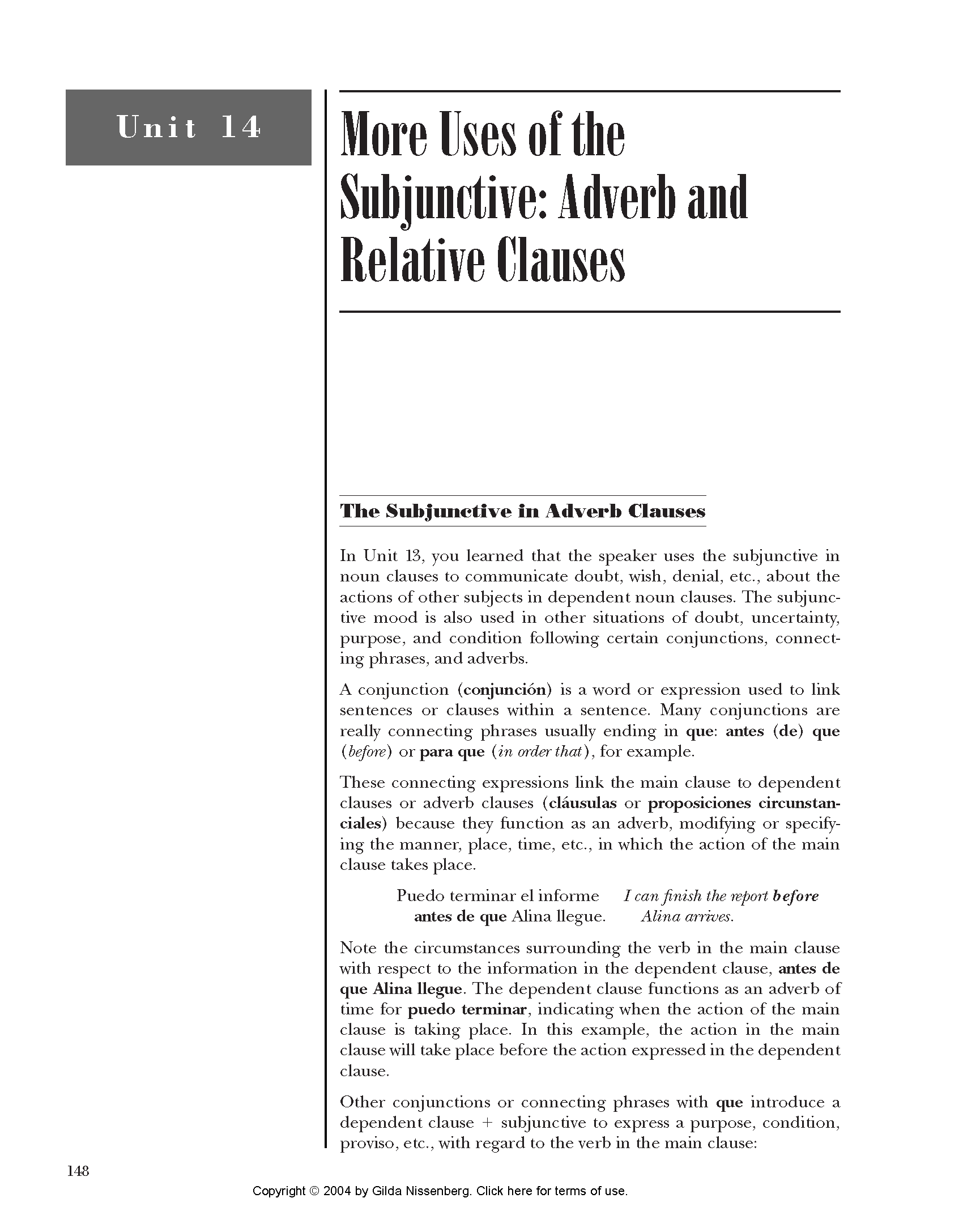CSG159

Unit 14
Morę Uses of tlie Subjunctive: Adverb and Relative Clauses
The Suhjunetive in Adverb Clauses
In Unit 13, you learned that the speaker uses the subjunctive in noun clauses to communicate doubt, wish, denial, etc., about the actions of other subjects in dependent noun clauses. The subjunc-tive mood is also used in other situations of doubt, uncertainty, purpose, and condition following certain conjunctions, connect-ing phrases, and adverbs.
A conjunction (conjunción) is a word or expression used to link sentences or clauses within a sentence. Many conjunctions are really connecting phrases usually ending in que. antes (de) que
(before) or para que (in order that), for example.
These connecting expressions link the main clause to dependent clauses or adverb clauses (clausulas or proposiciones circunstan-ciales) because they function as an adverb, modifying or specify-ing the manner, place, time, etc., in which the action of the main clause takes place.
Puedo terminar el informe I can finish the report before
antes de que Alina llegue. Alina arrives.
Notę the circumstances surrounding the verb in the main clause with respect to the information in the dependent clause, antes de que Alina llegue. The dependent clause functions as an adverb of time for puedo terminar, indicating when the action of the main clause is taking place. In this example, the action in the main clause will take place before the action expressed in the dependent clause.
Other conjunctions or connecting phrases with que introduce a dependent clause + subjunctive to express a purpose, condition, proviso, etc., with regard to the verb in the main clause:
Copyright © 2004 by Giida Nissenberg. Ciick here for terms of use.
Wyszukiwarka
Podobne podstrony:
CSG162 Morę Uses of the Subjunctive: Adverb and Relative Clauses 151 14-4ejercicio Pareados. Luisy A
CSG166 Morę Uses of the Subjunctive: Adverb and Relative Clauses 155 8. Guando... mi
CSG160 149 Morę Uses of the Subjunctive: Adverb and Relative Clauses Leo el cuento de hadas para que
CSG162 Morę Uses of the Subjunctive: Adverb and Relative Clauses 151 14-4ejercicio Pareados. Luisy A
CSG164 153 Morę Uses of the Subjunctive: Adverb and Relative Clauses 2. She brings
CSG166 Morę Uses of the Subjunctive: Adverb and Relative Clauses 155 8. Guando... mi
CSG168 157 Morę Uses of the Subjunctive: Adverb and Relative Clauses 4. People nee
CSG170 159 Morę Uses of the Subjunctive: Adverb and Relative Clauses Saludare a Manuel dondequiera q
CSG172 161 Morę Uses of the Subjunctive: Adverb and Relative Clauses 3. Probably B
57307 P1170446 172 Janusz Osioja-Zagórsk 2 Ecxmom*c At the dechnr of the Btonze Age and even morę so
P1170446 172 Janusz Osioja-Zagórsk 2 Ecxmom*c At the dechnr of the Btonze Age and even morę so — in
Report 8 69 Cherutich TABLE 1: Comparison of thermal output of wells drilled with and without aerate
Page 26 Cognition, is the basis of both the teaching and the learning processes in Education. Theref
więcej podobnych podstron